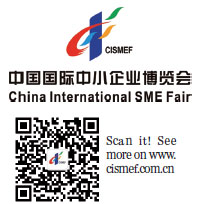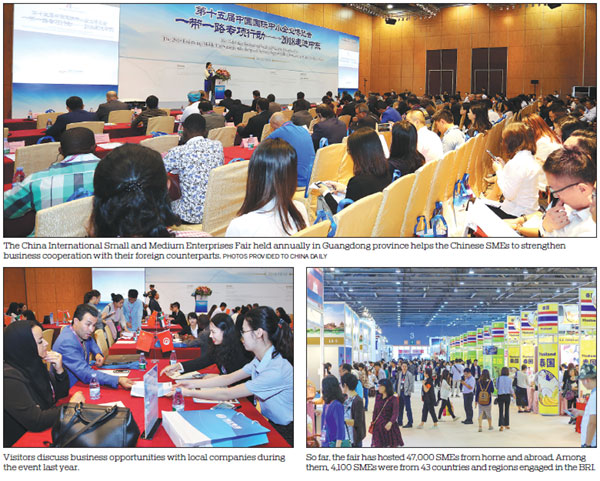Expo gets trade flowing across borders
Major annual event helps secure deals between hundreds of companies over 15 years
The China International Small and Medium Enterprises Fair, held annually in Guangdong province of South China since 2004, has promoted the construction of the Belt and Road Initiative and strengthened business exchanges and cooperation of SMEs in China and the BRI countries and regions.
For 15 years, the fair has been committed to building a platform of "display, trade, exchange and cooperation" for Chinese SMEs and their foreign counterparts. It is now one of the largest events of its kind in the world.
So far, the fair has hosted 47,000 SMEs from home and abroad. Of them, 4,100 SMEs were from 43 BRI countries and regions including Bulgaria, Poland, Russia, Estonia, Italy and Singapore. This year, 25 BRI countries and regions have confirmed their participation. Out of that, Saudi Arabia, Fiji and Ethiopia will be at the fair for the first time.
The 16th China International SME fair, with the theme of "intelligence, wisdom, smart manufacturing and energy conservation", will be held in Guangzhou, capital of the province, on June 24-27.
Its total exhibition area will reach 160,000 square meters, including a 60,000-sq-m area set for overseas, provincial, municipal and cross-border e-commerce exhibitors. Two other professional fairs of smart home appliances and international furniture, each with an exhibition area of 50,000 sq m, were held in March.
Since 2005, the fair has used a co-host mechanism, a unique model of working with foreign parties to host the event. To date, it has invited 19 nations and international organizations as the co-hosts.
This includes 11 BRI countries and regions such as Italy, South Korea, Thailand, Vietnam, Ecuador, Indonesia and South Africa.
Italy, for example, was the co-host country of the fair's third session in 2006.
Nearly 400 Italian companies led by the country's former prime minister, Romano Prodi, had negotiations with more than 1,000 Chinese SMEs. They signed a series of contracts and agreements on technology imports and industrial chain cooperation.
South Korea co-hosted the fifth session in 2008. South Korean companies showcased their latest technologies in nine industries including agricultural products, seafood, medical appliances, cosmetics, chemicals, environmental protection equipment and articles for daily use.
In 2011, the fair invited Thailand as its co-host and Russia as its official guest country, which was a highlight of the eighth session.
A total of 335 companies from the two countries participated, covering industries such as petrochemical, medicine, biotech, cosmetics and fashion.
Vietnam and Ecuador were the fair's co-hosts in 2012. The latter was also the first South American country to collaborate with the event.
More than 30 Ecuadorian companies displayed their products in an exhibition area featuring the country's unique culture and concepts of innovation, environmental protection and life enjoyment.
Vietnam sent 45 companies to the fair, showcasing handicrafts, woodworks and products of agriculture, energy conservation and environmental protection. In 2015, Malaysia was invited to serve as the co-host of the fair. A senior official of the Malaysia External Trade Development Corporation headed a government delegation that attracted 150 SMEs to the event.
They took up nearly 3,000 sq m of exhibition area and displayed food, drinks, textiles, clothing, cosmetics, and real estate and healthcare products.
The country also established a food street at the exhibition area, providing local snacks to visitors and promoting its food culture.
In 2016, the 13th session of the fair welcomed its first African co-host country, Cote d'Ivoire, and the first BRICS country, India.
This helped promote exchanges and cooperation between SMEs in China and their counterparts in Africa. It also aided economic and trade cooperation between China and the other BRICS countries.
Both countries sent ministers to lead government and corporate delegations to the event.
More than 60 companies from Cote d'Ivoire participated, specializing in industries such as machinery, agriculture, energy, architecture, logistics and services. India dispatched 124 SMEs to showcase textiles, machinery, hardware and electrical appliances.
The fair's 14th session in 2017 was co-hosted by South Africa and the United Nations Industrial Development Organization. About 40 SMEs from South African countries displayed products in manufacturing, renewable energy, tourism, jewelry, wine, handicraft and service industries.
They also signed intention cooperation agreements for 112 projects during the event. The co-host country of last year's fair was the United Arab Emirates. The UAE delegation to the event selected 75 companies specializing in agricultural products, retail sales, information, communication, culture and tourism, covering an exhibition area of nearly 1,000 sq m.

Since 2017, the fair has organized a Belt and Road Special Activity. The first was themed on Africa.
Thirty-five representatives of companies, commerce chambers and business associations from 12 African countries, including Mali, Comoros, Benin, Ghana and Uganda, had discussions with 200 Chinese companies over trade and economic cooperation.
In 2018, the Special Activity focused on the Middle East, attracting delegates from 47 companies, commerce chambers and business associations from 12 countries and regions. They had talks with 300 Chinese SMEs, reaching $120 million in import-export volume on site. This year, the Special Activity will turn its focus to Latin America.
haonan@chinadaily.com.cn

(China Daily 04/26/2019 page18)















